- Home
- Patrick O'Brian
The Mauritius Command Page 4
The Mauritius Command Read online
Page 4
'Not to ours, brother,' said Jack, 'not to ours. And I will not thank you, since you don't like it; but Lord, Stephen, I am a different man.' He was indeed. Taller, younger, pinker, his eyes blazing with life. His stoop had gone, and a great boyish grin kept ruining his attempted gravity.
'You will not mention this to Sophie, nor to any other person,' said Stephen, with a cold, penetrating glare.
'Must I not even start looking to my sea-chest?'
'What a fellow you are, Jack!' cried Stephen, in great disgust. 'Of course you must not, not until the port admiral's messenger is come. Cannot you see the obvious cause and effect? I should have thought it plain even to the meanest intelligence.'
'A ship!' cried Jack, springing heavily into the air. There were tears in his eyes, and Stephen saw that he might wish to shake hands at any minute. He disliked all effusion, privately thinking the English far too much given to weeping and the flow of soul; he pursed his lips with a sour expression, and put his hands behind his back. He said, 'Plain to the meanest intelligence: I appear—you have a ship. What must Sophie conclude? Where is my character?'
'How long do you think the port-admiral's messenger will be, Stephen?' asked Jack, with nothing but a loving smile at these harsh words.
'Let us hope he outpaces Lady Clonfert by a few minutes at least, if only to prove that casual gossip does not necessarily have to run faster than official orders every single time. How we shall ever win this war I cannot tell. In Whitehall they know perfectly well that success in the Mauritius enterprise is of capital importance, and yet some fool must be prating. I cannot express my abhorrence of their levity. We reinforce the Cape, and tell them so: they instantly reinforce the Ile de France, that is to say, Mauritius. And so it runs, all, all of a piece throughout: Mr. Congreve invents a military rocket with vast potentialities—we instantly inform the world, like a hen that has laid an egg, thus throwing away all the effect of surprise. The worthy Mr. Snodgrass finds out a way of rendering old ships serviceable in a short time and at little expense: without a moment's pause we publish his method in all the papers, together with drawings, lest some particular should escape our enemy's comprehension.'
Jack looked as solemn as he could, and shook his head; but very soon he turned a beaming face to Stephen and asked, 'Do you imagine this will be one of your standoff-and-on capers? Ordered to sea at a moment's notice, recalled, turned on shore for a month, all your hands drafted elsewhere, and then sent to the Baltic at last in your hot-weather clothes?'
'I do not. Quite apart from the absolute importance of the operation, there are many members of the Board and of the ministry that have their money in East India stock: ruin the Company and you ruin them. No, no: there is likely to be a wonderful degree of celerity in this case, I believe.'
Jack laughed aloud with pleasure, and then observed that they must be getting back to the house—the boy from the Crown was waiting for an answer. 'I shall have to give that wretched woman a lift,' he added. 'You cannot refuse a brother-officer's wife, the wife of a man you know; but Lord, how I wish I could get out of it. Come, let us walk in.'
'I cannot advise it,' said Stephen. 'Sophie would detect you instantly. You are as transparent as a bride. Stay here till I desire Sophie to make your joint reply to Lady Clonfert: you cannot be seen until you have your orders.'
'I shall go to the observatory,' said Jack.
It was here that Stephen found him some minutes later, with his telescope trained on the Portsmouth road. 'Sophie has answered,' said Stephen, 'and every woman in the house is now scrubbing the parlour and changing the lace window-curtains; they turned me out with very little ceremony, I can tell you.'
The promised rain began to fall, drumming briskly on the copper dome: there was just room for them both, and there they crouched in silence for a while. Beneath the bubbling current of his pure joy, Jack longed to ask whether Stephen had in some way arranged Captain Loveless's tenesmus; but although he had known Stephen intimately these many, many years, there was something about him that forbade questioning.
Presently, his mind sobering, he reflected on the Indian Ocean, on the fine blue-water sailing with the southeast trade-wind, the perilous inshore navigation among the coral reefs surrounding La Réunion and Mauritius; on the typical Admiralty decision to send one frigate to counterbalance four; on the immense difficulty of maintaining even a blockade, above all in the hurricane months, let alone that of landing upon those islands, with their few harbours (and those fortified), their. broad reefs, the perpetual heavy surf on their inhospitable shores; on the question of water, and on the nature of the force likely to oppose him. To oppose him, that is to say, if ever he reached the station. Furtively stretching out to touch a piece of wood, he said, 'This hypothetical squadron, Stephen, have you any idea of its strength, and what it might have to deal with?'
'I wish I had, my dear,' said Stephen. 'The Néréide and the Sirius were mentioned, to be sure, together with the Otter and the possibility of another sloop; but beyond that everything is nebulous. Vessels that Admiral Bertie had at the time of his latest despatches, dated more than three months ago, may very well be off Java by the time the squadron is actually formed. Nor can I speak to what Decaen may have had in Mauritius before this reinforcement, apart from the Canonnière and possibly the Sémillante—they range so wide. On the other hand I can tell you the names of their new frigates. They are the Vénus, Manche, Bellone and Caroline.'
'Vénus, Manche, Bellone, Caroline,' said Jack, frowning. 'I have never heard of a single one of 'em.'
'No. As I said, they are new, quite new: they carry forty guns apiece. Twenty four pounders, at least in the case of the Bellone and the Manche: perhaps in the others too.'
'Oh, indeed?' said Jack, his eye still to his telescope. The rosy glow in his mind had strange lurid edges to it now. Those were in fact the French navy's most recent, very heavy frigates, the envy of the British dockyards. Buonaparte had all the forests of Europe at his command, splendid Dalmatian oak, tall northern spars, best Riga hemp; and although the man himself was the merest soldier, his ship-builders turned out the finest vessels afloat and he had some very capable officers to command them. Forty guns apiece. The Néréide had thirty-six, but only twelve-pounders: Boadicea and Sirius, with their eighteen-pounders, might be a match for the Frenchmen, particularly if the French crews were as new as their ships; but even so, that was a hundred and sixty guns to a hundred and ten to say nothing of the broadside weight of metal. Everything would depend on how those guns were handled. The other forces at the Cape hardly entered into the line of count. The flagship, the ancient Raisonable, 64, could no more be considered a fighting unit than the antique French Canonnière: he could not offhand recall the smaller vessels on the station, apart from the Otter, a pretty eighteen-gun ship-sloop: but in any case, if it came to a general action, the frigates alone must bear the brunt. The Néréide he knew of, the crack frigate of the West Indies station, and in Corbett she had a fighting captain; Pym he knew by reputation; but Clonfert of the Otter was the only captain he had ever sailed with . . . Across the round of his objective-glass travelled a purposeful Marine, mounted on a horse. 'O blessed form,' murmured Jack, following him behind a haystack with his telescope, 'he will be here in twenty minutes. I shall give him a guinea.' All at once the Indian Ocean, the Mauritius command, took on a new, infinitely more concrete reality: the characters of Admiral Bertie, Captain Pym, Captain Corbett and even Lord Clonfert assumed a great practical importance: so did the immediate problems of a new command. Although his intimacy with Stephen Maturin did not allow him to ask questions that might be judged impertinent, it was of such a rare kind that he could ask for money without the least hesitation. 'Have you any money, Stephen?' he said, the Marine having vanished in the trees. 'How I hope you have. I shall have to borrow the Marine's guinea from you, and a great deal more besides, if his message is what I dearly trust. My half-pay is not due until the month after next, and we are living on credi
t.'
'Money, is it?' said Stephen, who had been thinking about lemurs. There were lemurs in Madagascar: might there not be lemurs on Réunion? Lemurs concealed among the forests and the mountains of the interior? 'Money? Oh, yes, I have money galore.' He felt in his pockets. 'The question is, where is it?' He felt again, patted his bosom, and brought out a couple of greasy two pound notes on a country bank. 'That is not it,' he muttered, going through his pockets again. 'Yet I was sure—was it in my other coat? did I perhaps leave it in London?—you are growing old, Maturin—ah, you dog, there you are!' he cried triumphantly, returning to the first pocket and drawing forth a neat roll, tied with tape. 'There. I had confused it with my lancet-case. It was Mrs Broad of the Grapes that did it up, finding it in a Bank of England wrapper that I had—that I had neglected. A most ingenious way of carrying money, calculated to deceive the pick-pocket. I hope it will suffice.'
'How much is it?' asked Jack.
'Sixty or seventy pound, I dare say.'
'But, Stephen, the top note is a fifty, and so is the next. I do not believe you ever counted them.'
'Well, never mind, never mind,' said Stephen testily. 'I meant a hundred and sixty. Indeed, I said as much, only you did not attend.'
They both straightened, cocking their ears. Through the beating of the rain came Sophie's voice calling, 'Jack! Jack!' and rising to a squeak as she darted into the observatory, breathless and wet. 'There is a Marine from the port admiral,' she said between her gasps, 'and he will not give his message except into your own hands. Oh, Jack, might it be a ship?'
A ship it was. Captain Aubrey was required and directed to repair aboard HMS Boadicea and to take upon himself the command of the said vessel, for which the enclosed order was to be the warrant: he was to touch at Plymouth, there to receive on board R.T. Farquhar, Esquire, at the Commissioner's office, and any further orders that might be transmitted to him at that place. These stately, somewhat inimical documents (as usual, Captain Aubrey was to fail not, at his peril), were accompanied by a friendly note from the Admiral, asking Jack to dine with him the next day, before going aboard.
Now that direct action was legitimate, it burst forth with such force that Ashgrove Cottage was turned upside-down in a moment. At first Mrs Williams clung tenaciously to her scheme for changing the parlour curtains, clamouring that it must be done—what would Lady Clonfert think?—and protesting that she should not be overborne; but her strength was as nothing compared with that of a newly appointed frigate-captain burning to join his ship before the evening gun, and in a few minutes she joined her daughter and the distracted maid in brushing uniforms, madly darning stockings and ironing neck-cloths, while Jack trundled his sea-chest in the attic and roared down to know where was his neat's-foot oil, and who had been at his pistols? adjuring them 'to bear a hand,' 'to look alive', 'to lose not a minute below there', 'to light along the sextant-case'.
Lady Clonfert's arrival, so much in the forefront of Mrs Williams's mind not an hour before, passed almost unnoticed in the turmoil, a turmoil increased by the howling of neglected children, which reached its paroxysm as her coachman thundered on the door. A full two minutes of strenuous battering passed by before the door was opened and she was able to walk into the naked parlour, whose old curtains lay on one end of the settle and the new on the other.
Poor lady, she had but a sad time of it. She had dressed with particular care in garments designed not to offend Mrs Aubrey by being too fashionable or becoming yet at the same time to beguile Captain Aubrey, and she had prepared an artless speech about sailors' wives, Clonfert's respect and affection for his old shipmate, and her perfect familiarity with life aboard a man-of-war, together with some slight hints as to her acquaintance with General Mulgrave, the First Lord, and with Mrs Bertie, the wife of the Admiral at the Cape. This she delivered to Stephen, wedged into a dim corner by the clock under a drip, with some charming asides to Sophie; and she was obliged to repeat it when Jack appeared, trailing cobwebs from the attic and bearing his chest. It is difficult to sound artless twice in quick succession, but she did her best, for she was sincerely devoted to the prospect of escaping an English winter, and the idea of seeing her husband again filled her with a pleasurable excitement. Her confusion caused her bosom to rise and fall, a blush to overspread her pretty face, and from his corner Stephen observed that she was doing quite well against heavy odds—that Jack, at least, was not unmoved by her distress. Yet he also noticed, with regret, a certain stiffening in Sophie's attitude, a constraint in her civil smile, and something near acerbity in her reply to Lady Clonfert's suggestion that she too might darn the Captain's stockings and make herself useful during the voyage. Mrs Williams's stony reserve, her repeated sniff, her ostentatious busyness, he took for granted; but although he had long known that jealousy formed part of Sophie's character—perhaps the only part that he could have wished otherwise he was grieved to see it thus displayed. Jack had caught the signals as quickly as his friend—Stephen saw his anxious glance—and his cordiality towards Lady Clonfert, never very great, sensibly diminished; although he did repeat what he had said at the beginning—that he should be happy to carry her ladyship to the Cape. What had preceded that glance, to make it so anxious? Dr. Maturin lapsed into a meditation upon the marriage state: monogamy, an aberration? How widely spread in time and place? How strictly observed? From this train of thought he was aroused by Jack's strong voice stating that her ladyship was certainly aware of the tediousness of tiding down the Channel, that he strongly recommended her posting to Plymouth, that he begged stores and baggage might be kept to a minimum, and that once again he must urge the most exact punctuality however short the notice: 'for his part he should gladly lose a tide to be of use, but on the King's service he must not lose a minute.'
Now everybody was standing up: soon Jack had led Lady Clonfert, under an umbrella, to her carriage, had firmly closed the door upon her, and was back in the house, his face radiating universal goodwill, as though she were utterly dismissed.
Mrs Williams was abusing Lady Clonfert's tippet, complexion and morals with a volubility that Stephen could not but admire, yet Jack's statement that a couple of hours would see his dunnage corded up, that Stephen would oblige him infinitely by riding straight to Gosport in order to bring back John Parley in Newman's dogcart to pack the telescope, and that he was determined to go aboard before the evening gun and to get the Boadicea to sea on the ebb, struck her dumb. It had no such effect on her daughter, however, who instantly produced a number of reasons why Jack could certainly not join tonight: the state of his linen would bring discredit on the service; it would be shockingly rude to dear, kind Admiral Wells not to dine with him, most impolitic if not direct insubordination; and Jack had always been such a friend to discipline. Besides, it was raining. It was clear to Stephen that she was not only horrified at losing Jack so soon but that she was also sorry for her recent—shrewishness was far too strong a word—for she now ran straight on into praise of their visitor. Lady Clonfert was a most elegant, well-bred woman, with remarkably fine eyes; her wish to Join her husband was in every way meritorious and understandable; her. presence aboard would certainly please the gun-room, indeed the whole ship's company.
Sophie then returned to arguments against Jack's leaving quite so soon: tomorrow morning would be far, far better in every way; they could not possibly have his clothes ready before then. In spite of her nimble wit, logical arguments soon began to run short, and Stephen, feeling that at any moment she might resort to others, even to tears, or appeal to him for support, slipped quietly out of the room. He communed with his horse in its outhouse for a while, and when he came back he found Jack at the door, staring up at the scudding clouds, with Sophie, looking exceptionally beautiful in her anxiety and emotion, beside him. 'The glass is rising,' said Jack thoughtfully, 'but the wind is still due south . . . and when you consider where she lays, right up the harbour, there is not a hope of getting her out on this tide. No, my dear; perhaps you ar
e right. Perhaps I should not go aboard until tomorrow. But tomorrow, sweetheart,' he said, looking fondly down, tomorrow at the crack of dawn you lose your husband to his natural element.'

 The Final Unfinished Voyage of Jack Aubrey
The Final Unfinished Voyage of Jack Aubrey The Rendezvous and Other Stories
The Rendezvous and Other Stories Caesar: The Life Story of a Panda-Leopard
Caesar: The Life Story of a Panda-Leopard The Hundred Days
The Hundred Days The Yellow Admiral
The Yellow Admiral The Fortune of War
The Fortune of War The Mauritius Command
The Mauritius Command Beasts Royal: Twelve Tales of Adventure
Beasts Royal: Twelve Tales of Adventure A Book of Voyages
A Book of Voyages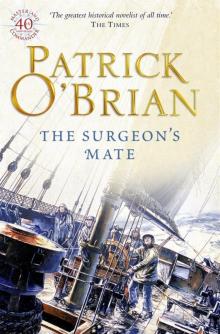 The Surgeon's Mate
The Surgeon's Mate The Golden Ocean
The Golden Ocean Hussein: An Entertainment
Hussein: An Entertainment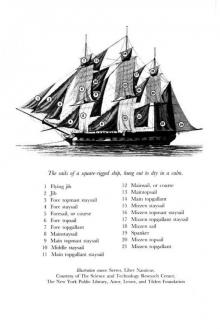 H.M.S. Surprise
H.M.S. Surprise The Far Side of the World
The Far Side of the World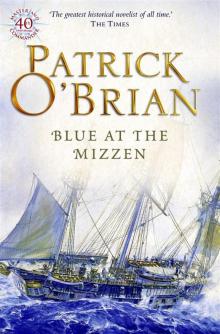 Blue at the Mizzen
Blue at the Mizzen The Unknown Shore
The Unknown Shore The Reverse of the Medal
The Reverse of the Medal Testimonies
Testimonies Master and Commander
Master and Commander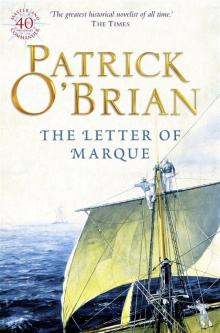 The Letter of Marque
The Letter of Marque Treason's Harbour
Treason's Harbour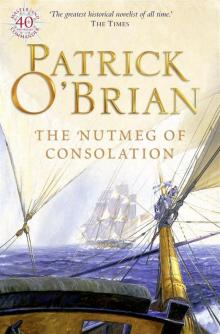 The Nutmeg of Consolation
The Nutmeg of Consolation 21: The Final Unfinished Voyage of Jack Aubrey
21: The Final Unfinished Voyage of Jack Aubrey The Thirteen-Gun Salute
The Thirteen-Gun Salute The Ionian Mission
The Ionian Mission Men-of-War
Men-of-War The Commodore
The Commodore The Catalans
The Catalans Aub-Mat 08 - The Ionian Mission
Aub-Mat 08 - The Ionian Mission Post Captain
Post Captain The Road to Samarcand
The Road to Samarcand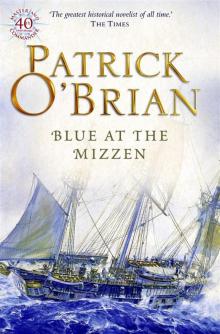 Book 20 - Blue At The Mizzen
Book 20 - Blue At The Mizzen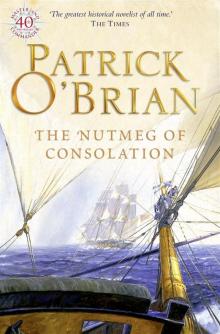 Book 14 - The Nutmeg Of Consolation
Book 14 - The Nutmeg Of Consolation Caesar
Caesar The Wine-Dark Sea
The Wine-Dark Sea Book 8 - The Ionian Mission
Book 8 - The Ionian Mission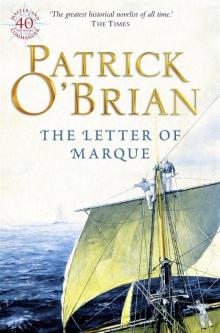 Book 12 - The Letter of Marque
Book 12 - The Letter of Marque Hussein
Hussein Book 9 - Treason's Harbour
Book 9 - Treason's Harbour Book 19 - The Hundred Days
Book 19 - The Hundred Days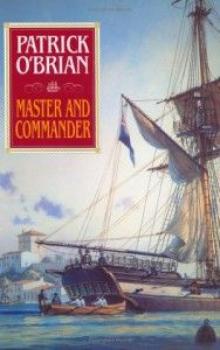 Master & Commander a-1
Master & Commander a-1 Book 11 - The Reverse Of The Medal
Book 11 - The Reverse Of The Medal Book 2 - Post Captain
Book 2 - Post Captain The Truelove
The Truelove The Thirteen Gun Salute
The Thirteen Gun Salute Book 17 - The Commodore
Book 17 - The Commodore The Final, Unfinished Voyage of Jack Aubrey
The Final, Unfinished Voyage of Jack Aubrey Book 10 - The Far Side Of The World
Book 10 - The Far Side Of The World Book 5 - Desolation Island
Book 5 - Desolation Island Beasts Royal
Beasts Royal Book 18 - The Yellow Admiral
Book 18 - The Yellow Admiral Book 15 - Clarissa Oakes
Book 15 - Clarissa Oakes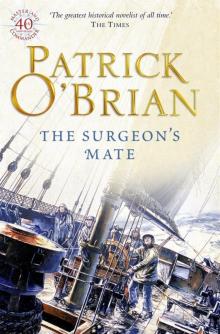 Book 7 - The Surgeon's Mate
Book 7 - The Surgeon's Mate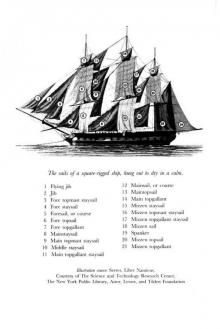 Book 3 - H.M.S. Surprise
Book 3 - H.M.S. Surprise Desolation island
Desolation island Picasso: A Biography
Picasso: A Biography Book 4 - The Mauritius Command
Book 4 - The Mauritius Command Book 1 - Master & Commander
Book 1 - Master & Commander Book 6 - The Fortune Of War
Book 6 - The Fortune Of War Book 13 - The Thirteen-Gun Salute
Book 13 - The Thirteen-Gun Salute Book 16 - The Wine-Dark Sea
Book 16 - The Wine-Dark Sea